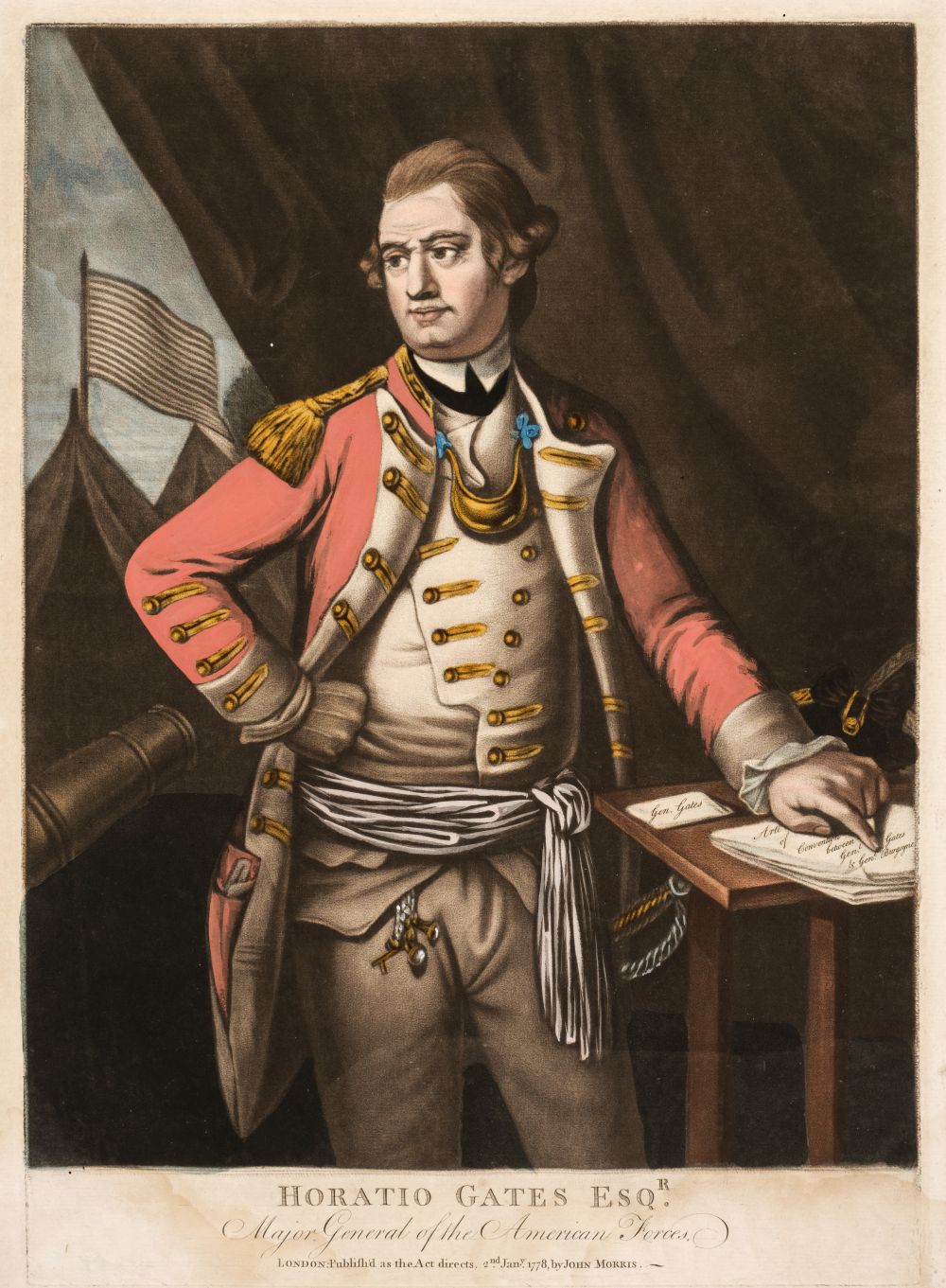Property from the Eric C. Caren CollectionGATES, HORATIOHoratio Gates's own copy of The Pennsylvania Packet or The General Advertiser, no Vol. or issue number. Philadelphia; Printed and Sold by John Dunlap, Saturday, January 23, 1779 Folio, 4 pages (16 1/4 x 9 3/4 in.; 413 x 250 mm) on a full sheet of laid paper, fine woodcut vignette of a sailing ship in the masthead, text in three columns; small wax drop on first page, a few short marginal tears, disbound. Accompanied by an engraved portrait of Gates. The consignor has independently obtained a letter of authenticity from PSA that will accompany the lot. Horatio Gates's own copy of an issue of The Pennsylvania Packet from the period of his command of the Eastern Department of the Continental Army, with his subscriber's name written in the top margin of the first page: "Major Genl. Gates." While Revolutionary-era newspapers owned by statesmen are not uncommon, it is much scarcer to find one belonging to a military officer. The better part of this issue is devoted to a lengthy analysis of "the veracity of Common Sense" written by Colonel John Parke under the pen name Philalethes. Parke's target was not Thomas Paine's celebrated 1776 polemic, but rather Paine's series of articles attacking Silas Deane, which he signed with the title of his pamphlet. Deane was one of three Americans appointed as commissioners sent to France in December 1776 (the other two were Benjamin Franklin and Arthur Lee . Deane was recalled by Congress after being accused by Lee of financial impropriety. He published a self-defense, "The Address of Silas Deane to the Free and Virtuous Citizens of America," in the Pennsylvania Packet issue of 5 December 1778, after which Paine and Parke soon joined the fray in the pages of the paper. This issue may have been of particular interest to General Gates, because it was Deane's role in obtaining military supplies that made possible the former's victory at Saratoga.Condition ReportCondition as described in catalogue entry. The lot is sold in the condition it is in at the time of sale. The
Property from the Eric C. Caren CollectionGATES, HORATIOHoratio Gates's own copy of The Pennsylvania Packet or The General Advertiser, no Vol. or issue number. Philadelphia; Printed and Sold by John Dunlap, Saturday, January 23, 1779 Folio, 4 pages (16 1/4 x 9 3/4 in.; 413 x 250 mm) on a full sheet of laid paper, fine woodcut vignette of a sailing ship in the masthead, text in three columns; small wax drop on first page, a few short marginal tears, disbound. Accompanied by an engraved portrait of Gates. The consignor has independently obtained a letter of authenticity from PSA that will accompany the lot. Horatio Gates's own copy of an issue of The Pennsylvania Packet from the period of his command of the Eastern Department of the Continental Army, with his subscriber's name written in the top margin of the first page: "Major Genl. Gates." While Revolutionary-era newspapers owned by statesmen are not uncommon, it is much scarcer to find one belonging to a military officer. The better part of this issue is devoted to a lengthy analysis of "the veracity of Common Sense" written by Colonel John Parke under the pen name Philalethes. Parke's target was not Thomas Paine's celebrated 1776 polemic, but rather Paine's series of articles attacking Silas Deane, which he signed with the title of his pamphlet. Deane was one of three Americans appointed as commissioners sent to France in December 1776 (the other two were Benjamin Franklin and Arthur Lee . Deane was recalled by Congress after being accused by Lee of financial impropriety. He published a self-defense, "The Address of Silas Deane to the Free and Virtuous Citizens of America," in the Pennsylvania Packet issue of 5 December 1778, after which Paine and Parke soon joined the fray in the pages of the paper. This issue may have been of particular interest to General Gates, because it was Deane's role in obtaining military supplies that made possible the former's victory at Saratoga.Condition ReportCondition as described in catalogue entry. The lot is sold in the condition it is in at the time of sale. The















Testen Sie LotSearch und seine Premium-Features 7 Tage - ohne Kosten!
Lassen Sie sich automatisch über neue Objekte in kommenden Auktionen benachrichtigen.
Suchauftrag anlegen